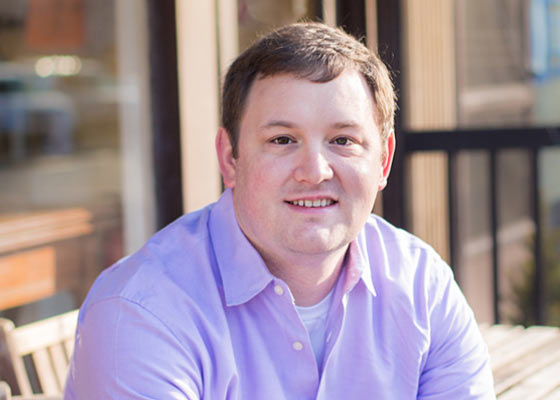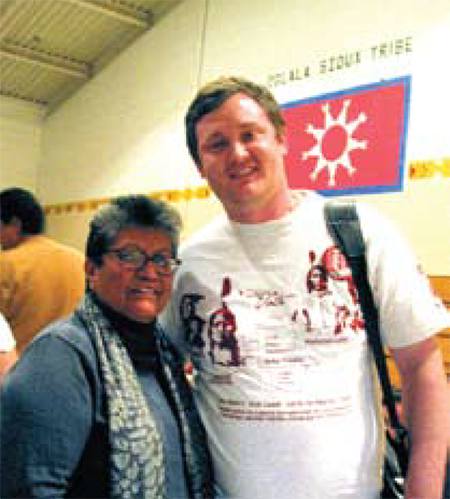2008 Profile: Greg Lembrich, Legal Director

Greg Lembrich is “Ready to Rumble: A Lawyer on the Voting-Rights Frontline”
Greg Lembrich first volunteered in South Dakota during the 2002 general election, offering to do voter registration, get out the vote, and voter protection work. “I couldn’t build schools or roads, but I could help Tribal members elect people they support who could,” Lembrich says.
What he saw monitoring the polls, however, lit a passion to champion Native voting rights going forward: “I have watched people outside a polling place telling Native Americans it was actually elsewhere,” he told Huffington Post in 2010. “I’ve heard Native voters threatened, as in ‘I know your boss; I’ll get you fired.’”
As Legal Director of Four Directions, Lembrich has managed our voter protection work since 2008. During each election cycle, Lembrich works with his former law firm Pillsbury Winthrop Shaw Pittman, his alma mater Columbia Law School, and the University of South Dakota Law School, among other partners, to send as many as 50 lawyers, law students, and Tribal volunteers to help Native voters exercise the franchise at polling locations on reservations across South Dakota.
In addition, Lembrich has provided election protection trainings and written a manual that’s been adopted by allies including the National Congress of American Indians and Tribes countrywide.
He has prevented white county commissioners from closing polling locations in Tribal communities and has protected satellite voting offices for in-person absentee voting on the Pine Ridge Indian Reservation. For his service, the National Law Journal recognized the Pillsbury law firm with a 2008 Pro Bono Award.
Why is this work important? “South Dakota is the frontline of today’s civil-rights battle,” says Lembrich. “And Four Directions is breaking down barriers for Native voters there and across the country.”
Ready to Rumble: A Lawyer on the Voting-Rights Frontline
STEPHANIE WOODARD
HUFFINGTONPOST.COM; 10.13.10
Students Monitor Voting on South Dakota Sioux Reservations
COLUMBIA LAW SCHOOL; 12.9.10
Post Office Closings Threaten Native Voting Rights
STEPHANIE WOODARD
INDIAN COUNTRY TODAY MEDIA NETWORK; 10.21.11
Surprise 11th Hour Native Vote Agreements
STEPHANIE WOODARD
INDIAN COUNTRY TODAY MEDIA NETWORK; 10.18.14
Greg Lembrich is a big lawyer. For one, he’s a tenacious litigator at a top firm, Pillsbury Winthrop Shaw Pittman. But equally important for his pro-bono election-protection work on Indian reservations, the 6-foot-4-inch, 250-pound Lembrich is – simply put – a rather large lawyer. When going toe-to-toe in polling-place parking lots or back rooms with ranchers and political-party operatives attempting to prevent Native American citizens from casting ballots, he’s needed every inch and ounce, along with his encyclopedic knowledge of election law.
STEPHANIE WOODARD, HUFFINGTONPOST.COM, 10.13.10
On-the-Ground Voter Protection

On Election Day, 2010, 10 Pillsbury lawyers from five different offices traveled to South Dakota’s Indian reservations to monitor polls and assist Native American voters. These on-the-ground voter protection efforts, along with Four Directions’ and Pillsbury’s success in protecting access to early voting, helped boost turnout among Native American voters this year.
“Despite efforts to disenfranchise Native American voters and deny them equal early voting opportunities,” Greg Lembrich said, “voters on South Dakota’s major reservations avoided the statewide trend of lower participation and came out in even greater numbers than the previous midterm election.”
South Dakota’s voter turnout was down 5 points compared with the 2006 midterm election, but turnout increased for the reservation counties where Pillsbury lawyers volunteered—more than 3.5 points in Shannon County and 6 points in Todd County.
Greg is legal director for Four Directions and works with the National Congress of American Indians on its nationwide Native Vote initiative. He trains voting rights advocates on state and federal election laws, enabling these advocates to serve in Native American communities throughout the country. He also leads Pillsbury’s election protection efforts, training and organizing Pillsbury’s volunteers.
This is the second time Pillsbury lawyers have traveled to South Dakota to monitor polls for Native American voters, with Greg leading a team for the 2008 presidential election, a pro
bono effort that earned Pillsbury an award from the National Law Journal.
The presence of these trained election monitors eliminates problems of intimidation and harassment of Native American voters, according to O.J. Semans, the executive director of Four Directions. Poll monitors are trained to advocate for voters and serve as liaisons to poll workers and county election officials, reducing the frustration that easily discourages tribal members’ already tentative participation.
Pillsbury volunteers worked this year with voters and poll workers to keep voters from being rejected or redirected to a distant voting place because of poll workers’ confusion or misinterpretation of the law.
In addition to Greg, volunteers this year included Los Angeles partner Jennie La Prade, DC partner Lauren Lynch Flick, New York senior counsel Portis Hicks, Sacramento counsel Thomas Makris, DC senior associate Jamie Bobotek, New York senior associate Yuri Pope, DC associate Catherine Branch, Northern Virginia associate Eric Compton and DC associate Craig Saperstein.
PILLSBURY CORPORATE SOCIAL RESPONSIBILITY UPDATE, FALL, 2010
